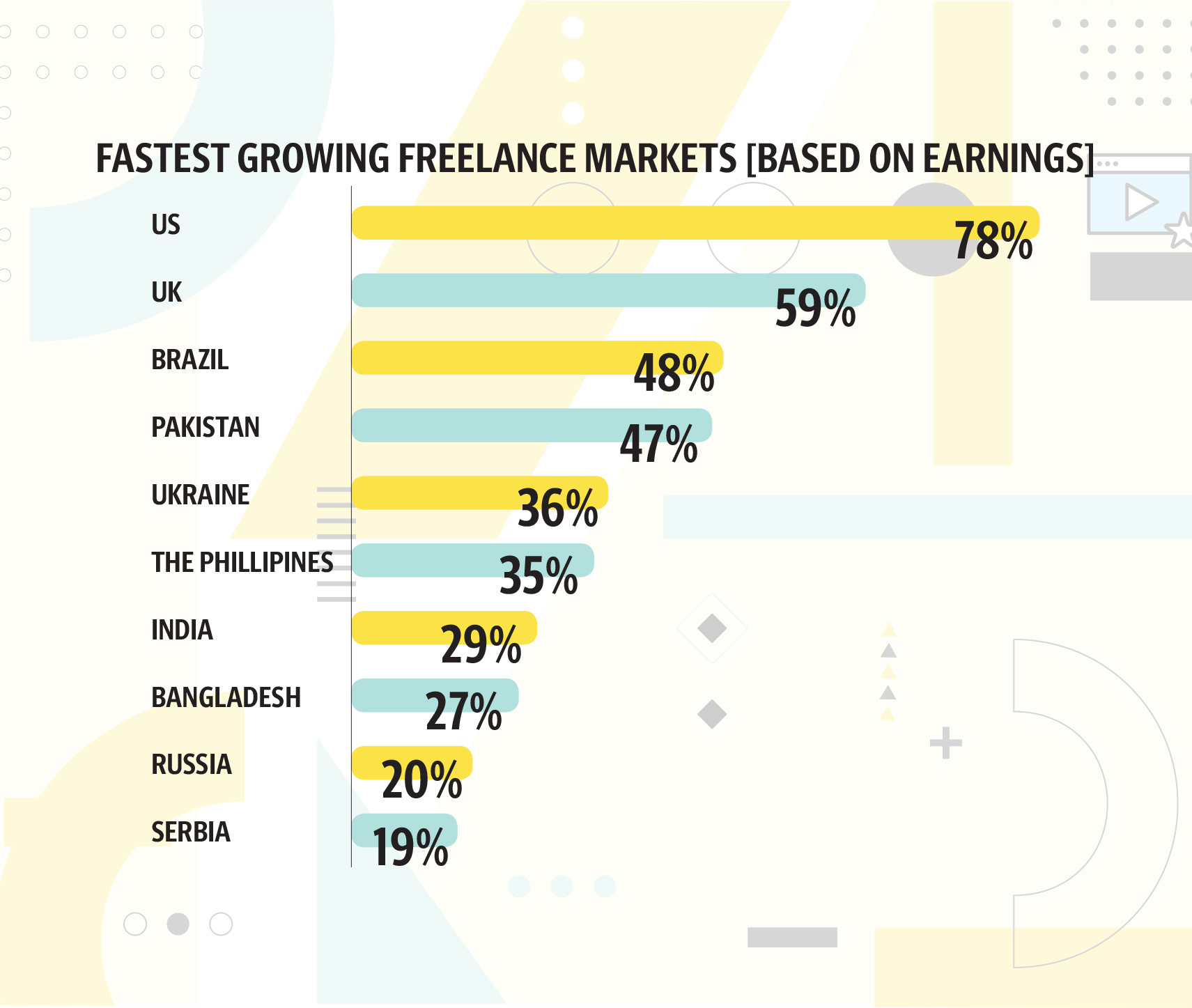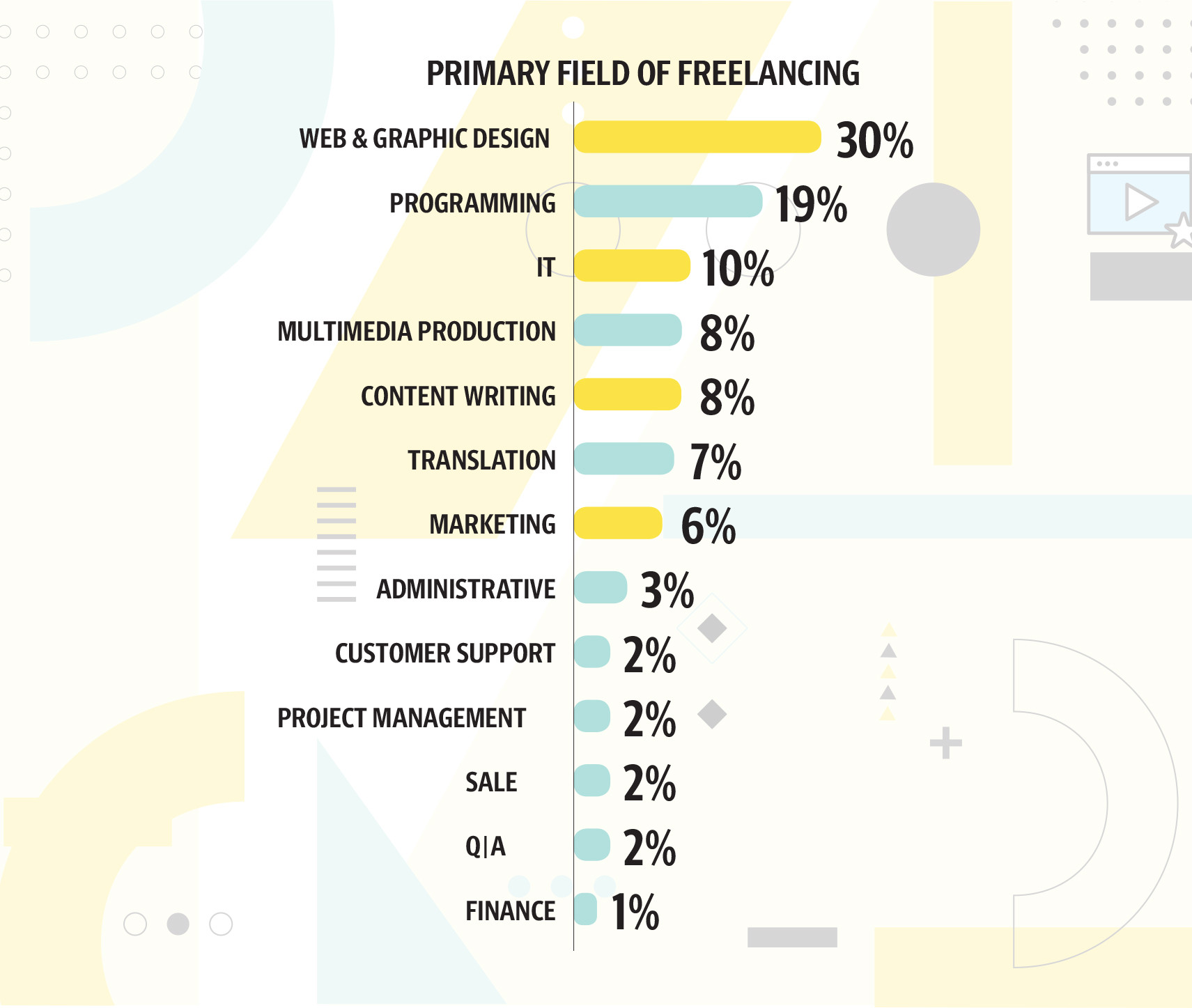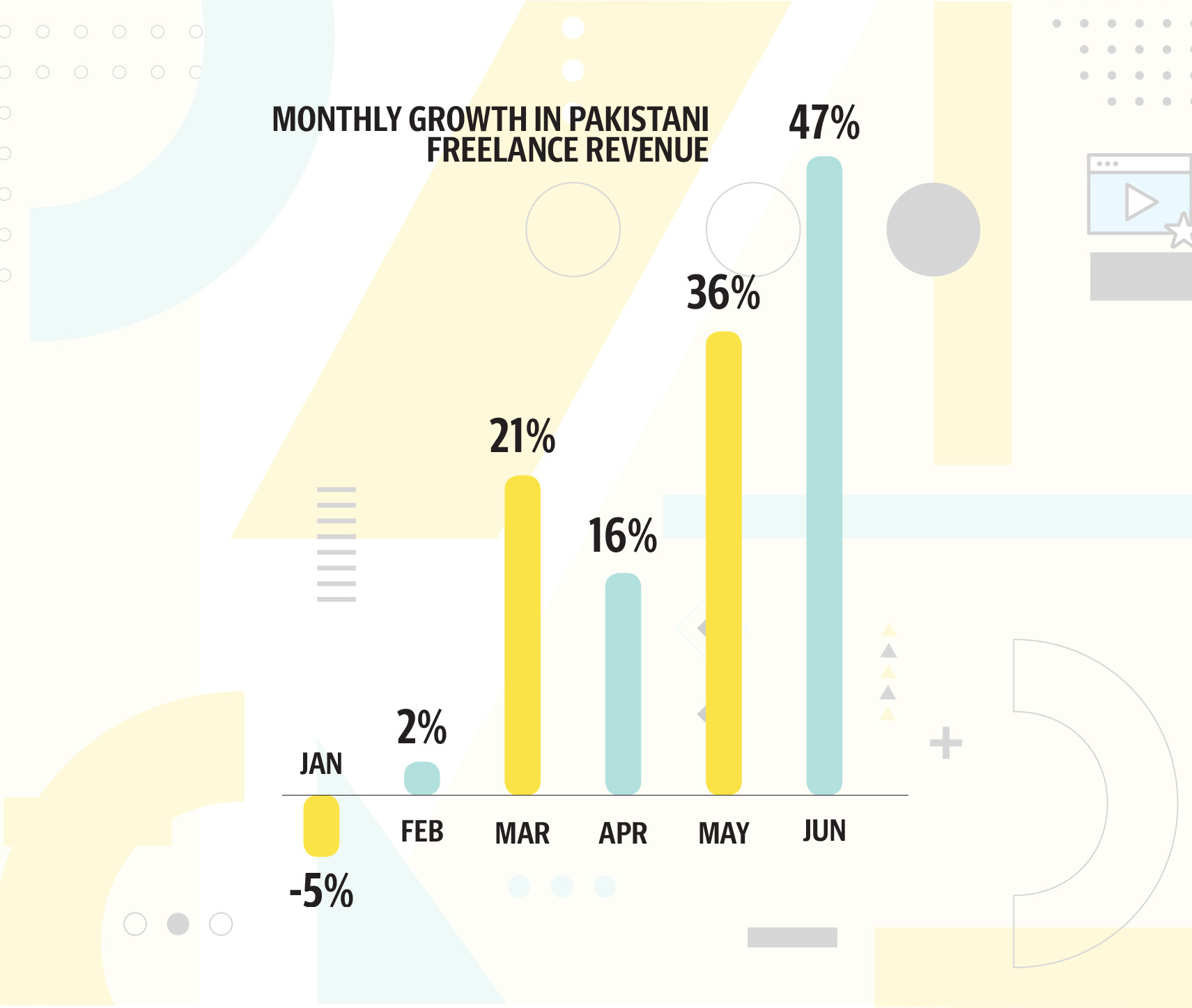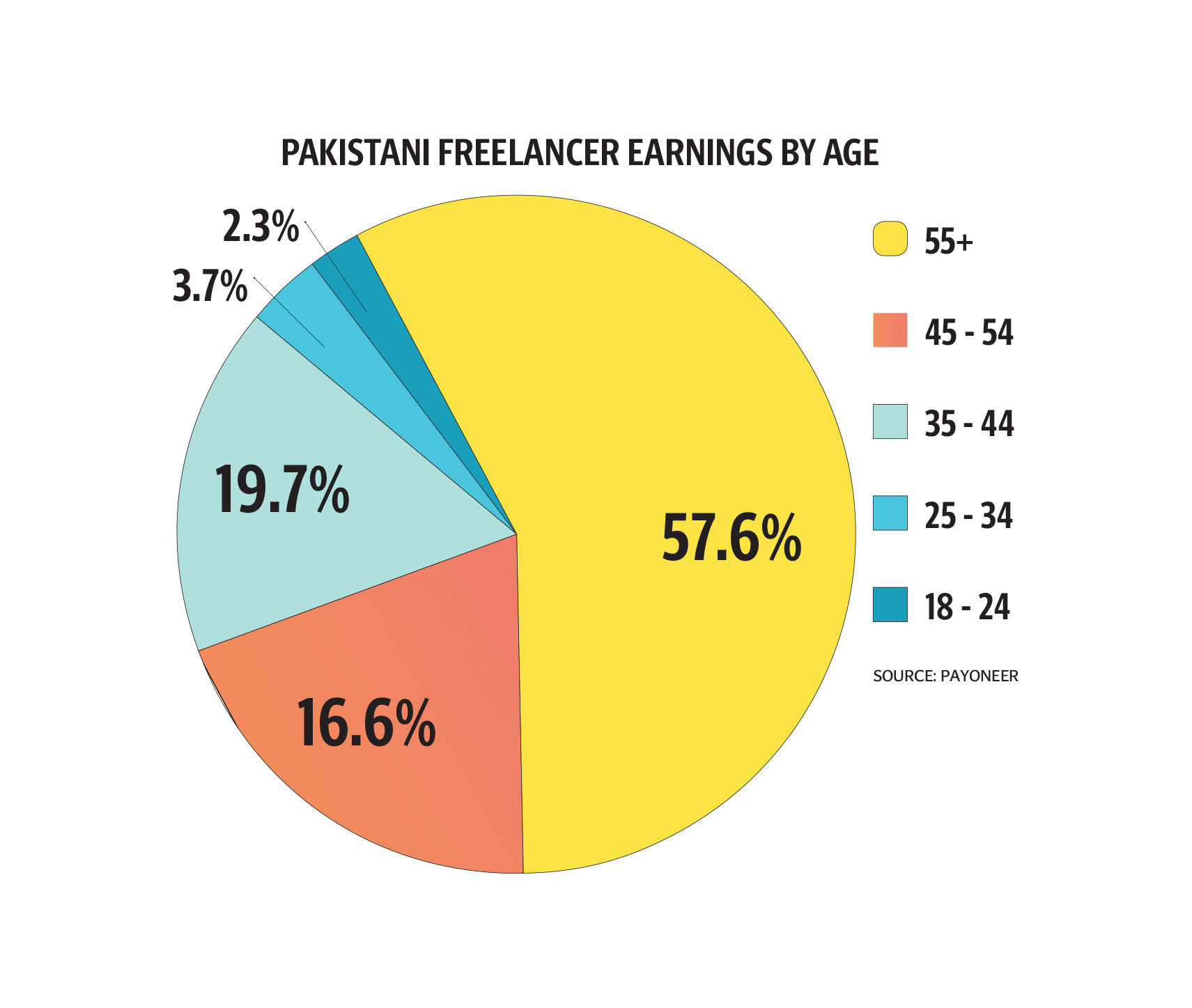Covid-19 has dramatically transformed the employment ecosystem all over the world. Large-scale layoffs by bigwig global firms have given a significant push to the gig economy.
According to Investopedia, a gig economy is a scenario where temporary, flexible jobs are commonplace and companies tend to hire independent contractors and freelancers instead of full-time employees.
“A gig economy undermines the traditional economy of full-time workers who often focus on their career development,” it states. “The result is cheaper, more efficient services for those willing to use them.”
People who do not use technological services such as the Internet may be left behind of the benefits of the gig economy.
Creative: Mohsin Alam
Last year, World Bank Lead Economist for Social Protection and Jobs Federica Saliola said “gig” jobs will continue to grow but digital infrastructure is scarce or of low quality in many developing countries. Therefore, she called for investment in digital capacity and appropriate regulations for platform firms should be a global priority.
Echoing similar views, JustJobs Network President and Executive Director Sabina Dewan and International Labour Organisation Ekkehard Ernst said that the pandemic was fueling the platform economy.
From e-commerce to the gig economy, consumers are increasingly tapping the Internet to connect with goods and services from the safety of their homes, they underlined.
They held the view that the gig economy’s low barriers to entry present new employment opportunities—and new hazards—for developing economies.
“The danger is that the bulging supply of young and low-skilled workers drawn to platforms is likely to exceed the demand for their services as data processors, customer service representatives, and ride-hailing service drivers,” the two officials said.
They stressed that not only will these workers frequently find themselves “gigless”—that is, underemployed—but they will likely face downward pressure on working conditions.
Evidence from countries where an increasing share of workers compete on gig platforms confirms that wages are getting squeezed. And the assumption that most gig workers were previously in poor-quality informal work doesn’t always hold.
According to them, the risk, for workers, goes well beyond immediate job losses and hiring freezes amid rising gig economy. The deeper danger is that companies will be less inclined to build permanent workforces, relying instead on cheaper gig, temporary, or contractual workers.
Fighting for recognition
The ballooning global gig economy has led to a host of labour issues and a handful of lawsuits against contracting firms.
In 2016, drivers of a prominent ride hailing service approached a London employment tribunal seeking due entitlements such as the minimum wage, paid holidays and rest breaks.
After the ruling was awarded in drivers’ favour, the ride-hailing firm approached the UK Supreme Court to overturn the verdict. In a ground breaking decision last month, the UK Supreme Court allowed Uber’s more than 70,000 British drivers to be paid the minimum wage while picking up and driving passengers as part of the ride-hailing company’s agreement to grant workers’ rights.
UK skirmish was the latest in a line of challenges over the rights of gig workers that could reshape the on-demand ride-hail and food delivery industry, in which most workers are considered independent contractors with few legal rights and benefits.
Worker groups, labour activists and some legislators across Europe and the United States have pushed for drivers to be recognised as employees instead.
In this regard, the European Commission has also taken steps towards improving the rights of gig economy workers with the launch of a public consultation to determine their legal employment status and how to improve their working conditions.
It argues that lockdowns to contain the Covid-19 pandemic have increased demand for casual workers as food deliverers have hired drivers, while cleaners, needed to battle the spread of infection, have faced health and safety risks.
On the other hand, Spanish unions have been granted access to the algorithms companies such use to manage their workforce in the gig economy, to monitor conditions and stop workers being underpaid in low-demand hours.
Such labour rights monitoring is part of Spain’s forthcoming legislation to bolster protections for service sector workers, typically hired on freelance basis, that will require employers to put them on staff contracts.
In addition, Egypt will also start registering millions of gig workers in order to offer them health insurance and emergency state aid during the coronavirus pandemic, which has taken a particularly heavy toll on the nation’s ad-hoc employees, officials said.
There are at least 14 million gig workers in Egypt, and while some workers and campaigners welcomed the government’s drive, others warned that many workers could be reluctant to sign up - fearing tax and social security payment demands.
The gig economy in Pakistan
Since Covid-19 surfaced in Pakistan over a year ago, many companies were forced to layoff employees to sustain smooth functioning amid the challenging posed by the virus.
In absence of large-scale hirings in the country, many sacked workers as well as job seekers and graduates turned towards the gig economy. In addition, a few people preferred to work part time in addition to full time jobs owing to a host of reasons. To gain deeper insights, The Express Tribune reached out to a few officials operating in the gig economy of Pakistan.
Rabeel Sundardas, Co-Founder and CEO of branding agency Appstract, detailed that the ecosystem in Pakistan, especially for services which are also being offered on freelance basis, is a bit different compared to services which are not offered by freelancers.
“However, when one enters the market and offers a certain service at a price, there is always a peer who bids a lower price for the same service which incentivises the client to get work done in a smaller amount of money,” she said.
Sundardas, whose agency had formerly been a part of gig market, added that when the lockdown was imposed in Pakistan in March 2020, there was not much problem finding clients however getting a competitive price for the product became a challenge.
“In terms of clients, we did not get affected to a large extent,” she said. “However, we got hit in terms of payments because clients were planning to pay from the money that they were expecting to make by selling their products.”
At that time, everyone was relying on others for payments to meet expenses, she said.
According to her, the primary trouble was finding clients who would commit to the project right away rather than postponing work until they had clarity on their expected inflows.
“There were times when clients were short on money and we had to seal the deal at a much lesser price than what we could have in usual days and this was a major drawback,” she said.
She appreciated that with Covid-19, the need of online presence for all business soared which was a giant leap forward for Pakistan in terms of digitalisation.
Echoing similar views, Lahore based freelancer Hamza Faiq Khan considers freelancing more comfortable than a full time job.
“At times, freelance work helps me make more money than a permanent job,” he said. “In addition, I gain more experience working with different clients on diverse schemes and it helps me grow in different fields of work.”
In freelance gigs, Khan does projects related to video editing and graphic designing.
He foresees growth in Pakistan gig economy keeping in view that people are getting all kinds of opportunities in contractual work.
Moreover, Karachi based freelance worker Rabiya Imran also projects expansion in local gig economy in the years to come.
Imran, who works as a freelance social media manager, added that in the pandemic, jobs are unstable or not available for a certain amount of people hence they were turning to the gig economy.
“Until the government figures out how to create jobs for the younger generation, people will keep looking to enter the gig economy in a bid to practice their field of expertise,” she said.
Supporting her views, a source in the freelance industry, on the condition of anonymity, said that a lot of people were entering the gig economy to earn extra money in addition to their permanent jobs.
Some people even made freelance work their primary sources of income.
“It is particularly helpful in this country for women because a lot of women struggle to work outside of their homes,” she said. “Moreover, considering the saturated job market, individuals are taking whatever opportunities are available to them.”
She was of the view that freelancing was easily accessible as compared to other decent paying options in Pakistan.
Balance and flexibility
Elaborating on the opportunities present in the gig economy, Sundardas was of the view that the good thing about contractual work is that a person could work on their own hours and terms while being paid for what they can produce.
In permanent jobs, employees sometimes do a lot more work than what is written in the job description while they are paid according to the responsibilities in JD and are expected to take on extra projects to be considered for a promotion.
“Another advantage of contractual work is that you are your own boss and can work on your own terms and conditions,” she said. “You can draft a particular deal and adjust it for the client indicating clearly how long you would be working each day and how much extra will client have to pay for the extra work that you undertook”
She said that an added constraint is when the freelancer/agency has to take care of the cost that are incurred while working on the project for eg, equipments, rent, internet and other overheads.
According to her, Pakistanis could earn more in contractual work than permanent work.
She added that salary in a permanent jobs remains capped at a certain level but in the gig economy, it can rise way above that point if the person is able to negotiate a better deal or work prolonged hours.
“As the worker gains experience in contractual work, they start finishing tasks quickly, achieving more in less time and making more money which can be encouraging for youngsters,” she said. “In addition, the US dollar is quite strong against the rupee (at around 155) and keeping that in mind, people are moving into freelance work as they earn more from taking gigs from foreign clients than they can earn locally.”
She stressed that this factor in particular, posed a win win situation for clients as they were able to get work done in a lesser amount than what they would have paid to businesses in their own countries.
Giving example of her own business, she said that it was set up without any investment and whatever expenditure was done on the firm was through earnings that the initiative brought in.
“We paid all expenses from earnings that our projects generated,” she said.
On the other hand, Imran highlighted that freelancing helps her work from the comfort of her house.
“Furthermore, I get to be as creative as possible,” she said. “Brands do add their input however their involvement in my strategy remains very low.”
She noted that she gets paid different amounts every month depending on the gigs that she takes.
The source in the freelance industry added that in the gig economy, one has the option to earn in various currencies instead of their own which gives motivation in a country like Pakistan whose currency is extremely devalued.
A question of trust
Appstract CEO said that there were a handful of challenges hindering the growth of gig economy in Pakistan.
“In freelance or contractual work, until and unless one has a word of mouth to vouch for them, they cannot get much business,” she said. “If you are a young business, people prefer not to hire you and go for bigger names instead.”
Secondly, establishing a business in itself is a challenge.
She added that she and her business partner had a hard time knowing the potential costs, fulfilling the banking formalities, registering the company, paying rent and doing taxes.
Perhaps the biggest setback for Pakistan is that there are no dedicated business coaches out there.
She added there were a handful of coaches but they were far from having complete knowledge of freelance environment given that it has widened drastically in the past one year.
Lack of information and knowledge among Pakistanis is affecting growth of these businesses
“India and US have excellent coaches who specialise in guiding freelancers and they are doing a great service teaching their fellow countrymen,” she said.
According to her, lack of dedicated platforms was another problem because people look to land contractual work on platforms such as Facebook and LinkedIn.
Lack of payment facilities is another problem while opening bank accounts for freelancers is a troublesome in Pakistan, she said.
At present, freelancers cannot apply for bank accounts until they can prove steady flow of income.
“Finally, we have experienced problems in receiving money from Australia because Australian dollar cannot directly be added to Pakistani bank accounts,” she said. “It has to be converted to another currency such as euro or US dollar and then added to Pakistani bank accounts.”
She lamented that for one project for an Australian client, her firm lost 20% of the amount due to multiple conversions.
This is hindering growth of freelance ecosystem and gig economy, the official said.
Khan highlighted that other than reaching out to clients, there were substantial exposure and payment issues, which acted as challenges for new freelancers.
“Another hurdle that I faced was that fresh freelancers would devalue the price of projects by charging less than the competitive prices which would in turn decrease the market rates of projects and dent earnings,” he said.
The government has recently shared plans to introduce a tax on freelancers, which is discouraging in itself, he lamented.
According to Imran, unusual timings, which were at times way different than usual working hours, was a huge hassle.
At times, people in gig economies have to work round the clock and even during weekends, she said.
She further lamented that the professional side of the industry does not accept freelance gigs as working experience, which sparked additional troubles.
The source in the gig economy remarked that lack of formal platforms in Pakistan were a huge barrier hindering the growth of freelance ecosystem because in absence of dedicated platforms, people could get away without making payments.
She recalled that few of her clients ghosted her after the projects were completed and failed to pay for the work.
“There is no way in which such people can be held accountable,” she said.
Demand and supply is also huge issue in Pakistan and with influx of a lot of freelance workers in the ecosystem, most people are working at highly exploitative rates.
Finding gigs is not easy either because most platforms are informal or there is no centralised way to go about it and at times it depends on the networks one is a part of.
Improving the ecosystem
Sundardas emphasised that the government could enhance the financial infrastructure of Pakistan to give a push to the gig economy.
“In particular, the government should work on improving money transfer and payment methods,” she said. “One big barrier in the ecosystem is that the time taken between client making the payment and the firm receiving it is massive.”
She stressed that the waiting time sometimes was over one week.
In the process, substantial amount of money is also lost under the heads of conversion, sender fee, receivers fee and platform fee, she regretted.
She was of the view that introducing Paypal in particular and creating a banking infrastructure for freelancers such as allowing them to open bank accounts easily would help Pakistan as a whole.
She emphasised improvement on banking front would ease the doing business ecosystem of Pakistan drastically and it would steer the gig economy.
Apart from the demand to introduce Paypal, Khan called upon the leadership to work towards providing inexpensive high speed internet services which would be a huge benefit for the gig economy.
Imran also demanded introduction of international payment systems such as PayPal or Amazon Pay.
“This will help people land international gigs easily and without getting into the huge process of transferring money to the local bank account,” she said.
The source in the gig economy said government could create an official platform for gig work in Pakistan because the country is currently lacking a formal space where rules and regulations could be followed strictly.
Moreover, the government can offer courses or training to individuals as freelancing can help a lot of people earn additional income, she suggested.
On an upward swing
Sundardas projects steady growth in the gig economy of Pakistan.
“In the past few day, we have seen so many prominent freelancers emerge and make modest profits and at the same time, countless freelancing platforms have gained traction such as Fiverr and Upwork,” she said. “These platforms make it easier for gig economy workers to connect with clients all over the world.”
She detailed that South Asia possessed immense talent at all fronts and that was why clients from the first world were always on a lookout for people from Pakistan, India Bangladesh and other regional nations.
“Cost is no doubt a factor but the quality of work that people do on projects is also excellent,” she said.
She termed it encouraging that a massive chunk of population was now entering the gig economy.
According to her, if conducive environment was provided, more people would enter the freelance ecosystem.
Freelancing even helps create more job opportunities, she concluded.
